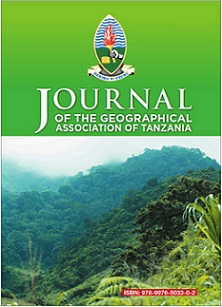Place-value Attachment on Provisional and Cultural Services for Sustainable Management of Ngezi Forest
Abstract
This paper uncovers the importance of people ' s place-values on sustainable forest management, and how such values can be incorporated into forest management actions and decision-making. Specifically, it focuses on mapping economic and cultural values on forest ecosystem services; assesses how non-materials and materials benefit from forest ecosystem cause landscape fragmentation; and how this information could assist in better forest planning and management. The data were collected from ten villages surrounding the Ngezi forest reserve in Pemba, Tanzania. Data were collected through participatory mapping, field observation, and focus group discussions. A map of place-values for each respondent was transferred from paper to digital format, digitized and coded using the GIS, and analysed using kernel density. Non-spatial data were processed and integrated into GIS-based spatial analysis. The results indicate that only 12 areas were identified as very high-valued and these require careful consideration for sustainable forest planning and management. About 4 out of 6 very high-valued areas for material services are found inside the reserve. The areas outside the reserve are undervalued and not utilized effectively for material services. Contrary to cultural services, only 1 out of 6 very high-valued places is located inside the reserve. Furthermore, economic situations, together with social driving forces, have been important determinants of forest values in the areas. Therefore, placevalues issues, particularly economic development outcomes, preservation of the aesthetics and improvement of recreational amenities should be considered when examining sustainable forest resource management.
Keywords: place-values, kernel density, forest management


